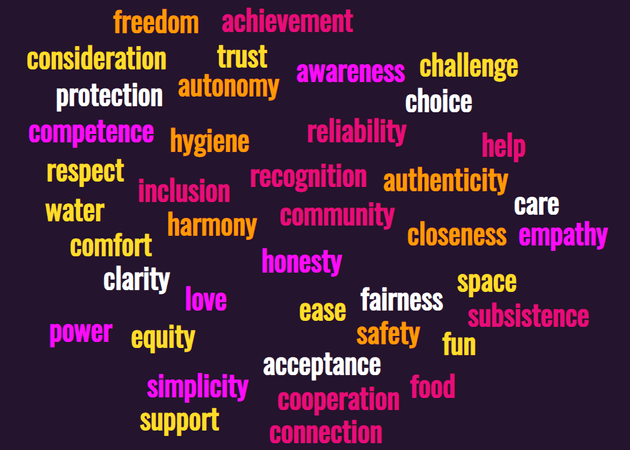The approach to decision making used in Decision Ninja draws on the work of Marshall Rosenberg on Nonviolent Communication (NVC).
This post looks at what NVC is, and how it relates to personal decision making.
Marshall Rosenberg
Marshall Rosenberg (1934 - 2015) was an American psychologist and mediator. He worked around the world in conflict resolution and peacemaking, including in Israel, Rwanda, Ireland, Nigeria, Serbia and Croatia.
Nonviolent Communication (NVC) is the approach to communication that he developed and used in this work. He subsequently worked to show that these same approaches could be applied much more widely. In fact, they apply in just about any interpersonal relationship.
Why do conflicts occur? A popular explanation is that conflict occurs when one person (or group)‘s needs are conflict with those of another. In these cases, the only solution is to persuade one or both groups can be persuaded to make some sort of compromise.
Marshall Rosenberg came to recognize that this formulation is misguided.
In truth it is very rare for there to be a direct conflict between the needs of one person and the needs of another. Although this may often appear to be the case, it frequently proves to be an illusion. This illusion arises from the unfortunate fact that we are not very good at recognizing and articulating what our needs actually are. Often, we become attached to specific ideas about what we want to happen, and our attachment to these ideas gets in the way of us recognizing what we actually need, or being open to any other way in which this need could be met.
Getting In Touch With Our Needs
Much of the theory of NVC is concerned with understanding the patterns of language and culture that tend to separate us from an awareness of our underlying needs - and hence lead us into conflict.
By understanding and avoiding these patterns, and substituting them with alternatives, we can achieve a much better understanding of our own needs, and the needs of others. We can use this understanding to reduce conflict, and find solutions that work for everyone - and to help others to do the same.
I don’t want to go into all this detail here (if you are interested see references “Further Reading”).
But there’s one specific technique from NVC, which we make use of in Decision Ninja. That is simply to direct ones attention to need words that seem relevant to a situation.
What are “need words”?
Here’s a selection of them…
I’m sure you recognize these words, and the needs that they represent. I expect that they are almost all things that you can remember needing yourself at some point in your life.
It’s not hard to see these words, and recognize them as descriptive of something that either is now - or has been - alive inside of us.
But most of us don’t, habitually, think about what’s going on inside ourselves in these terms. We are more prone to act reflexively without consideration of the needs that are driving us. Or if we do reflect, we direct our attention to thoughts, judgements, plans or strategies, rather than our underlying needs.
That’s exactly what happens in conflict situations. Both parties get attached to their thoughts, judgments or strategies, which conflict with the thoughts, judgements or strategies of the others. Conflict resolution in NVC works by bringing all parties to an awareness of their own underlying needs, together with an acknowledgement of those of the other parties. Once this mutual understanding is reached, conflicts become more tractable, and potential solutions start to become apparent.
Needs and Decision Making
A key focus of NVC is to explore how an awareness of our own needs, and the needs of others, can help to dissolve conflicts.
Yet the value of recognizing our own needs is bigger even than that.
When it comes to personal decision making, the most important consideration is which of our needs we are looking to meet. If you make a decision with an incorrect view of which needs you are trying to meet, it’s very likely that you’ll make a poor decision.
If it’s true that, much of the time, we don’t have much clarity or insight about what our needs actually are, then the chances of us making decisions that actually meet those needs seems to be slim.
Most advice around decision making is option-oriented. It focusses on analysis of the options that are available to us. We’re advised to “weigh up” the options. To make and list the pros and cons.
The underlying assumption of such advice is that we know what aspects of the various options to pay attention to. Or, in the simplest terms, that we know what matters to us. The evidence from NVC is that most of the time, we don’t.
Decision Ninja aims to support decision-making by bringing out very explicitly what matters to us in the context of this decision. This post explains a bit more about how it does that.
Further Reading
This post has given only a very brief introduction to NVC.
If you’re interested to learn more about NVC, take a look at the following resources:
-
Marshall Rosenberg’s book, “Nonviolent Communication: A Language of Life”
-
Erik Torenberg has a few Medium posts on Nonviolent Communication - this is a great one to start with.
-
This YouTube video of one of Marshall Rosenberg’s workshops in San Francisco. It’s 3 hours long, but fascinating to watch, and well worth making time for.
